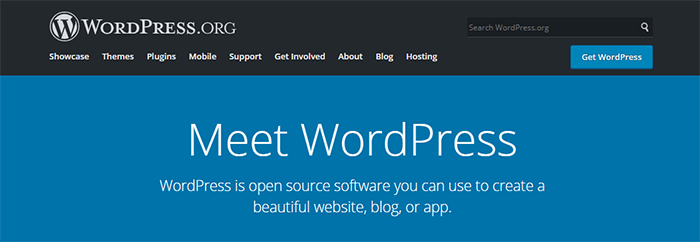If you are a website owner or a blogger, you must have heard the term WordPress. Launched in 2003, WordPress is the most powerful platform that has grabbed 58.5% share of the CMS market, while 27% websites and blogs on the internet are powered by WordPress. CNN, NBC, TED, and Best Buy are some of the best websites powered by WordPress.
Do you know WordPress has two different types? Yes, the two major types of WordPress are Hosted WordPress and Self-Hosted WordPress, with their distinct features. In this article, we will tell you the basic features, pros and cons of these two types of WordPress to help you choose the best for you. Let’s start with an introduction to both.
Hosted WordPress

If your website has been hosted on WordPress’s server, it is known as hosted-WordPress. It is free of cost, but the website’s URL remains a subdomain of WordPress such as mysite.wordpress.com.
However, you have the option to purchase the three packages of WordPress.com that can cost up to $4-$25 per month. The biggest drawback of the Hosted WordPress is that you have limited privileges and you may not be able to customize your website as per your needs.
Self-Hosted WordPress
Self-Hosted WordPress is Love. If you want to have full control over your website, go for Self Hosted WordPress as wordpress.org. You don’t need to worry about customizations and other technical specifications. You’ll enjoy tons of free and paid themes, plugins, and tools to equip your website with all the necessary features needed to rock over the internet. All you have to do is buy a domain name and hosting space and install WordPress on it. Purchasing a domain and server may cost you from $20-$50 yearly.
Which One Is the Best Choice for You?

99% of the experts prefer the Self Hosted WordPress as it gives you the liberty to install any theme and any plugin as per your requirements. You may modify the themes and plugins without any restrictions. However, if you have the budget constraints, you may choose the Hosted-Wordpress. Let us explain the Pros and Cons of Hosted and Self Hosted WordPress in detail.
Hosted WordPress – WordPress.com

Pros of Hosted WordPress
- Auto updates by the hosting provider
You don’t need to worry about the updates. As soon as a new update of WordPress, theme or the plugin is released, it will be updated on your website too.
- Free of Cost
It is free of cost. Rather, we can say that it’s partially free because if you want to get the dedicated domain name for your website, it requires to pay some bucks on a monthly or yearly basis.
Cons of Hosted WordPress
- Inability to customize
You have almost No or very limited rights to customize your website. Although you can go for the Hosted WordPress if you are a new blogger, if you have plans to grow your website and business in future, you will not be able to as per your requirements.
- Pathetic layout
You will be stuck with the theme’s layout. No change in colors, no change in social media icons, no change in the website’s fonts.
- Less effective monetization
You’ll have very limited chances of enabling the monetization on your blog as we have already said you’ll not be able to install any plugins so you can’t take full benefits of advertisement.
- Blog at risk
Your blog will be at risk because wordpress.com has the right to shut down your blog or wordpress.com readers may also flag your website.
Self-Hosted WordPress – WordPress.org

Pros of Self Hosted WordPress
- Full control over the website
The reason why I love Self Hosted WordPress is that I have full control over it. Installing new themes and plugins, and customization is easy in this type. Changing the layout, revamping the websites, and changing color schemes and fonts is a matter of minutes in Self Hosted WordPress.
- Ability to optimize every single page
Self-Hosted WordPress allows you to optimize every single page and image according to your strategy. On WordPress.com, you have very limited options for optimization that results in bad SEO of your website.
- Selection of the best Hosting provider
Self Hosted WordPress provides you with flexible size and speed. It offers numbers of web hosting space provider, and you can choose, space, server, speed, and other features, of your own choice.
- Effective use of marketing plugins
Self-Hosted WordPress is effective in marketing as well because you will have the authority to install relevant plugins to get more fruitful results. While running an e-commerce store, WordPress gives you full control over it so that you may grow your customer base with a plethora of different options and tools.
Cons of Self Hosted WordPress
- Development cost
If you are not a web developer, you may have to pay the development cost. Although Self-Hosted WordPress is very flexible to work on, when it comes to advanced customization, you may need to hire a professional web developer and pay him a lump sum amount.
- Domain and Web Hosting cost
It requires you to bear the domain, web hosting, and email cost. Although, you do not need to pay that much initially, with the passage of time this cost may increase as per your traffic requirements.
- Manual updates
Manual updating of the themes and plugin is required in Self Hosted WordPress. Perhaps, it is important to keep a tight check over the website so that you may update your website instantly if any update releases.
The risk of website hack or injection of suspicious codes into the website’s database is another drawback here that can cost you a huge loss.
Now you have all the details about both the types of WordPress. If you want to develop a business website or run a blog, Hosted WordPress is the right choice for you. Otherwise, you may choose the Hosted WordPress for any other purpose such as building a portfolio.
Choose one of your choice and needs, and start enjoying right away!


